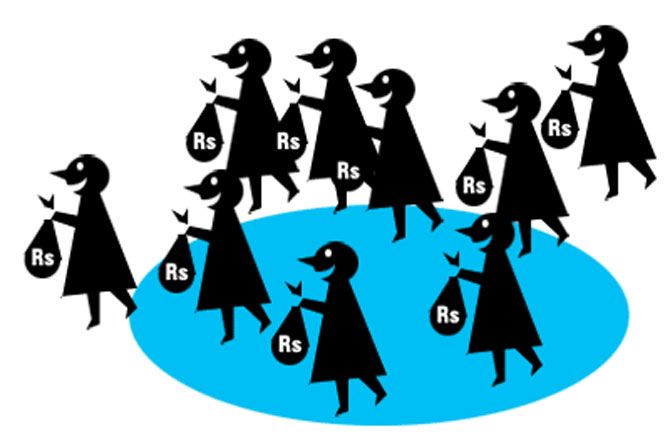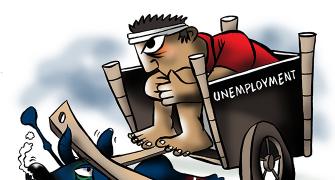E-proceeding of tax scrutiny has certain technical and practical issues which need to be addressed before making the system fully electronically driven.
Illustration: Uttam Ghosh/Rediff.com

The Centre’s proposal of tax scrutiny through an anonymised back office of the income-tax department could lead to litigation.
This would be more so in complex cases where there is an interpretation issue on a position taken by taxpayers in the filing of tax returns.
Sources say the e-proceeding has certain technical and practical issues which need to be addressed before making the system fully electronically driven.
The government wants to have computerised anonymous assessments in next two years wherein all scrutiny assessment would be done without any human interface between taxpayer and tax officer.
Finance Minister Piyush Goyal in his interim Budget speech said “our government has now approved a path breaking, technology-intensive project to transform the Income-tax department into a more assessee-friendly one.
"Within the next two years, almost all verification and assessment of returns selected for scrutiny will be done electronically through anonymised back office, manned by tax experts and officials, without any personal interface between taxpayers and tax officers.”
This new proposal is the extension of the existing e-proceeding (kicked off in the year 2017) which do not have the option of manual tax filing.
At present, e-communication is voluntary and a taxpayer can take a call on whether to conduct his dealing with the taxman over the e-system or through the existing procedure of manual submissions of documents by visiting the I-T department office.
"It is not feasible from technical perspective to understand the description/information given by taxpayers via electronic mode is adequate or not.
"It is difficult for the tax department to even analyse whether the information provided is complete or partial, causing a lot of disruption in the smooth functioning of the system," said an assessing officer, requesting anonymity.
Tax experts too believe that zero human interface may face practical challenges, as the current software is not equipped enough to upload all big size files, requires to explain the whole genesis.
“It has its advantages of having no human intervention which is time and cost savings but practically there are difficulties in uploading the submission to be made online as it is limited to data restriction of 50MB,” said Mithil Chokshi, senior partner, Chokshi & Chokshi LLP.
Currently, the submission size of a single file is maximum 5 MB. Tax payers have been complaining about documents not getting uploaded, so accordingly, assessee upload files after dividing as per the limit which is adding lot of burden.
While, assessing officer, too had to download multiple attachment which disturbs the continuity of scrutiny, besides opening the files which is equally time-consuming.
Sanjay Sanghvi, senior tax partner, Khaitan & Co, said, "While e-assessment would broadly save the lot of hardship to the taxpayers. However, it may create confusion and challenges in certain cases especially when there is an interpretation issue on a position taken by taxpayers in the tax filing."
Further, if there is no hearing for explaining a technical case it would amount to unjustified additions resulting into unnecessary litigation as fundamental principle of natural justice is not followed.
Hence the idea of e-assessment as brought out is a tremendous step to make India at par with other countries but there are certain disadvantages with respect to zero interference which needs to be tackled, Chokshi added.
Some experts also have issue with the identity as under the proposed system, taxpayers would never know who is examining the case but the assessing officer will have all the information.
“The measure of anonymous scrutiny /verification of the tax filing will certainly reduce the corruption and harassment. However, the option should be given to the taxpayers to explain their cases and legal stand in front of the tax authority.
"Denying this opportunity will lead to litigation. Also in this case, tax officer or his team would know the identity of the taxpayer but taxpayer will never know about the assessing officer,” said Amit Maheshwari, managing partner and International tax lead of Ashok Maheshwary & Associates.
The Central Board of Direct Taxes (CBDT) had in 2017 launched new procedure of e-communication which is applicable to all proceedings under the Income Tax Act, 1961.
It is a part of e-governance initiative to facilitate a simple way of communication between the department and the taxpayer, through electronic means, without the necessity of the taxpayer to visit the I-T office.
Under the e-proceeding regime, taxpayers have an option to file tax return manually, and could also visit office if required to understand the issue raised by the tax department and vice versa.
At present, when a taxpayer registers on the web portal, tax department sends a confirmation via SMS and email on the registered mobile number and email ID, indicating enrollment.
This facility is available for all types of notice, questionnaire, letter issued under various sections of the I-T Act.
Other than this, proceedings in first appeal for hearing notice, certain exemptions, seeking clarification can be also done via using the e-proceeding.
However, the CBDT had said in case the assessee choose for manual mode while e-proceedings on the e-filing website, further proceedings shall be conducted in manual mode.
The government believes that implementation of e-proceeding is a big success as it has increased the collection significantly.
“The I-T department now functions online. Returns, assessments, refunds and queries are all undertaken online. Last year, 99.54 per cent of the income-tax returns were accepted as they were filed,” Goyal said during the Budget speech.
He further said for making the life of our direct tax-payers easy, the government has reduced tax rates, more for the common man and middle class, and made the interface with the tax department much simpler and largely faceless.
“Due to this, the tax collections increased significantly from Rs 6.38 trillion in 2013-14 to almost Rs 12 trillion this year.
"The number of returns filed have also increased from 37.9 million to 68.5 million, showing 80 per cent growth in the tax base,” he said.










